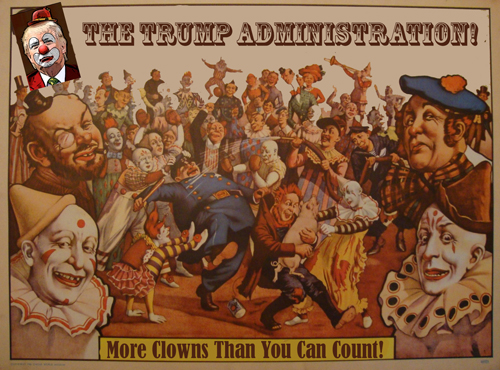No. Just no.
The Trump administration is making a push to sell off federal assets as part of its infrastructure plan released Monday.
Among the targets: Reagan National and Dulles International airports and two major parkways serving the Washington region, as well as power assets around the country, according to a copy of the proposal.
Power transmission assets from the Tennessee Valley Authority; the Southwestern Power Administration, which sells power in Arkansas, Kansas, Louisiana, Missouri, Oklahoma, and Texas; the Western Area Power Administration; and the Bonneville Power Administration, covering the Pacific northwest, were cited for potential divestiture. The Washington Aqueduct, which supplies drinking water in D.C. and Northern Virginia, also is on the list.
This isn’t fixing; it’s dumping.
“The Federal Government owns and operates certain infrastructure that would be more appropriately owned by State, local, or private entities,” the Trump plan says. It calls for giving federal agencies “authority to divest of Federal assets where the agencies can demonstrate an increase in value from the sale would optimize the taxpayer value.”
I don’t even know what that last sentence means. What it says to me is that Trump’s going to have a fire sale to benefit his corporate buddies, who will charge us citizen-rubes more in tolls and fees than we are paying in taxes for the same thing.
Some state officials said they were uncertain about how their residents would benefit from such a proposal. Federal assets come with crucial federal dollars that could not easily be replaced, officials said.
The states probably don’t want this stuff and don’t have the resources to take care of them. Or else, state taxes would have to go up.
The whole point of the plan is to pretend you’re doing something about infrastructure without spending any money.
The first thing you need to know about Donald Trump’s $1.5 trillion infrastructure plan is that it is, in fact, a $200 billion infrastructure plan. For those keeping score at home, it’s $200 billion from Washington and another $1.3 trillion dollars of state, local, and private money to be determined at a later date.
It comes out to $20 billion a year, over 10 years–a modest increase in the federal outlay for building projects. The government routinely spends several times that amount on this stuff: In 2014, for example, Washington spent $96 billion on transportation and water alone. Trump wants this new money to cover those projects–plus rural broadband and power, Superfund sites, and perhaps even commercial space travel.
About that $200 billion, though. It’s not being funded by, say, finally raising the federal gas tax. (That levy hasn’t changed in more than two decades, and it falls far short of paying for the Highway Trust Fund.) Instead, the plan depends on shifting the money from other parts of the government–including the departments charged with funding transportation and water projects. In Trump’s budget, which was also released today, the discretionary budget for the Department of Transportation falls by $3.7 billion; the EPA’s is cut by $2.8 billion. More broadly, the Center for American Progress says it has counted $281 billion in infrastructure cuts in the budget–making the two proposals a net negative for infrastructure spending.
I’ve written about this before. Trump’s plan calls for “cutting red tape,” meaning projects can charge ahead without proper environmental and other reviews. This is the magic bullet that will make all those infrastructure projects so much cheaper. Trump’s approach also depends on private entities wanting to take on these projects and spend their own money. This means the only projects that have any hope of getting done are those that can be monetized somehow.
You’ll like this — Trump thinks he’s an infrastructure genius because of his 1980s renovation of the Wollman Ice Rink in Central Park.
See also Trump’s infrastructure proposal, explained by Matt Yglesias.
The particular details of how Trump is proposing to parcel out the money are, however, basically irrelevant because of the White House’s stance on financing the program. …
…The really big question about Trump and infrastructure, ever since he won the election, is whether he actually wants to get something done on this or if it was just a campaign line. This proposal answers that question pretty definitively — by mashing up Trump’s vague rhetoric with his staff’s conventional hard-right politics, they’ve landed on a formula with no bipartisan appeal and no actual path forward.
Speaking of infrastructure, what’s up with Amtrak? There have been a string of passenger rail accidents with fatalities lately. Not that Trump noticed, but I have seen these things on the teevee.
Politico reports that the head of the acting chief of the Federal Railroad Administration resigned over the weekend because running railroads was getting in the way of his day job:
A top official charged with overseeing the safety of the nation’s railroads has resigned “effective immediately,” the Department of Transportation said Saturday after POLITICO raised questions about whether he was simultaneously working as a public relations consultant in Mississippi.
The news comes at a time of strain for the Federal Railroad Administration, which hasn’t had a permanent leader for more than a year while it investigates a string of fatal train crashes and deals with a rising trend of rail-related deaths.
Heath Hall became the Federal Railroad Administration’s acting chief after being appointed deputy administrator in June. But he subsequently appeared at least twice in local media reports last summer as a sheriff’s department spokesman in Madison County, Mississippi, where he has long run a public relations and political consulting firm.
The firm also continued to receive payments from the county for its services from July through December, despite Hall’s pledge in a federal ethics form that the business would be “dormant” while he worked at DOT. And Tiffany Lindemann, a former FRA public affairs official who left the agency in September, told POLITICO this week that she had fielded at least three requests from a Mississippi television journalist seeking to speak with Hall during the summer.
This was during a period when Hall was in charge of an agency with a $1.7 billion budget, overseeing the safety of 760 railroads, a multibillion-dollar freight rail industry and the safety of millions of passengers.
Hall has been on an extended leave of absence since last month due to what the FRA has described as a family emergency. But DOT officials said Saturday, after reviewing POLITICO’s latest questions, that his departure is now permanent.
This guy wasn’t supposed to be running railroads, anyway. A vote on Trump’s nominee, Ron Batory, has been held up by Chuck Schumer, who is holding out for federal money for a massive rail project in and around New York City.
 While we were mourning the deaths in Florida, the Bob Mueller investigation has continued. So far we don’t know if anything the Russians did had any effect, and there’s no new word about hacking. But there’s no question the Russians were doing something. Here is some Hot news :
While we were mourning the deaths in Florida, the Bob Mueller investigation has continued. So far we don’t know if anything the Russians did had any effect, and there’s no new word about hacking. But there’s no question the Russians were doing something. Here is some Hot news :




